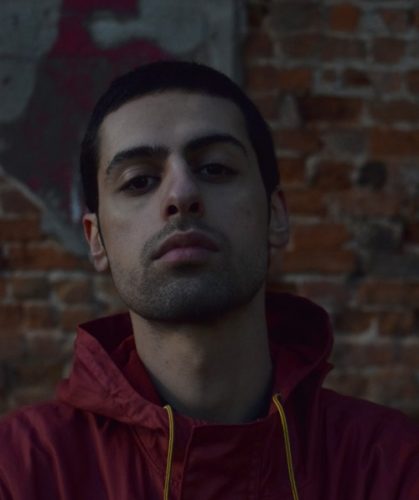By Colin Serjent
Photograph by Bryn Davies
Farhood Jafari, who specialises in rap music, was forced to flee Iran due to political reasons. “I had no option due to my political activities,” he said, before arriving in Liverpool in 2011.
He grew up in Tehran where he was going to study mathematics and architecture at a university there.
When he arrived in Liverpool he was imprisoned in Lancaster for four months because he did not possess the required asylum documents. He also suffered spells of homelessness and unemployment before moving to South Liverpool where he shared a house with Afghan asylum seekers.
“These experiences have only strengthened my resolve as a rapper,” he remarked.
Farhood now has the right to remain in the UK until 2020.
During 2016 he worked for Liverpool Arts Biennial as a mediator, during which time he worked with young people on art projects, dealt with artist funding and also supervised the running of venues during the festival.
He also ran public programmes, for example, staging film screenings about migrants and music events, held at the independent art space 24 Kitchen Street based in the Baltic Triangle.
“24 Kitchen Street has been very supportive of me in regard to playing live gigs,” commented Farhood. “I want to get more attention from the media in regard to my music.”
His debut EP ‘Tike Tike’, which means Part Part, Reminder Reminder, Recall Recall, relates to someone sacrificing themselves. The lyrics, delivered in Farsi, relate to gay people who are taken to hospital in Iran, with surgery performed on them to make them look like a woman, for example, attaching breasts and a vagina to their bodies.
“Homosexuals and lesbians have always been discriminated against in Iran,” said Farhood. “They are constantly made fun of.”
The EP also speaks out about the LGBT movement in general and womens rights in the Middle East.
Tike Tike was produced by Liverpool experimental artists Kepla and Ling.
Speaking about the difference between the approach and attitudes of Iranian rappers and those in the West, Farhood strongly believes those from his home country are more political than Western rappers, who strongly oppose Iranian culture and the current political system.
“I have worked with an Iranian rapper in Birmingham,he said,”and am going to work together again. I am looking forward to this.”
Farhood has also collaborated with a Kurdish rock musician based in Liverpool, who plays violin.
He is aiming to get more involved in producing music and magazines. In regard to magazines he contributes written articles and music on behalf of the publication ‘Between The Borders’, given this title because Europe is closing more and more borders. For example, he has penned articles on the UK deportation policies and has had his poetry published.
Farhood’s future plans include running a record label called Manteq (Iranian for logic) in Liverpool, specialising in Persian rap.
“I have found Liverpool very hospitable and have made many friends here. I love people more than myself.
“If I see injustice I will speak out about it. Fighting for justice is part of me. I have done it here and in Iran. I will fight for my rights and other people’s rights.
“When refused the right to seek asylum here mainly the only jobs you could find are fast food or takeaway outlets and car wash places. They are mainly run by other asylum seekers. When employed by them you often only get half the minimum wage, about £5 an hour.
“Often experienced professional people, who came to the UK from their native country, end up in low ranking jobs here.
“It is difficult to assimilate as an asylum seeker. It is hard to survive. There is a large divide between asylum seekers and the British community. It can create hate and misunderstandings.”
Farhood concluded my meeting with him by stating that, “A major problem in life is a lack of communication in many regards between migrants and the native community they are now based in.”

Permalink
always in my heart